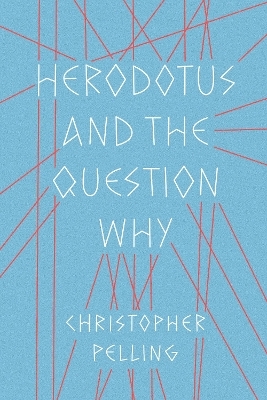
Herodotus and the Question Why
University of Texas Press (Verlag)
978-1-4773-2425-7 (ISBN)
In the 5th century BCE, Herodotus wrote the first known Western history to build on the tradition of Homeric storytelling, basing his text on empirical observations and arranging them systematically. Herodotus and the Question Why offers a comprehensive examination of the methods behind the Histories and the challenge of documenting human experiences, from the Persian Wars to cultural traditions.
In lively, accessible prose, Christopher Pelling explores such elements as reconstructing the mentalities of storyteller and audience alike; distinctions between the human and the divine; and the evolving concepts of freedom, democracy, and individualism. Pelling traces the similarities between Herodotus's approach to physical phenomena (Why does the Nile flood?) and to landmark events (Why did Xerxes invade Greece? And why did the Greeks win?), delivering a fascinating look at the explanatory process itself. The cultural forces that shaped Herodotus's thinking left a lasting legacy for us, making Herodotus and the Question Why especially relevant as we try to record and narrate the stories of our time and to fully understand them.
Christopher Pelling was Regius Professor of Greek at Oxford University from 2003 to 2015 and is now an Honorary Fellow of University College; he is also a Fellow of the British Academy and a Fellow of the Learned Society of Wales. He has held visiting positions at Utah State University, Washington and Lee University, and the University of North Carolina. His numerous previous books include Literary Texts and the Greek Historian and Plutarch and History. Most recently, he coauthored Twelve Voices from Greece and Rome: Ancient Ideas for Modern Times and a commentary on Herodotus 6.
Abbreviations
Preface
1. Why did it all happen?
(a) “Mother, what did they fight each other for?”
(b) The words
(c) Narrative: Show, not tell
(d) Explanation: A game for two
(e) Historical consciousness
(f) Reconstructing mentalities
2. To blame and to explain: Narrative complications
(a) The proem
(b) The exchange of abductions (1.1–5)
(c) Payback and its complications
(d) Whose fault is it anyway?
(e) Them and us
3. How can you possibly know?
(a) Putting in the working
(b) Scientific and historical explanation
(c) Stories in cahoots
4. Adventures in prose
(a) Something different?
(b) Hecataeus
(c) Other peoples and their past
(d) Rhetorical finger-pointing
(e) Sameness and difference
5. Hippocratic affinities
(a) Medical science
(b) Harmonious balancing
(c) Corroboration and revision
6. Explanations in combination
(a) Hippocratics
(b) Herodotus
7. Early moves
(a) Croesus and Candaules
(b) Croesus: Pride, aggression, downfall
8. Empire
(a) Croesus again
(b) From Cyrus to Xerxes
(c) Blame?
9. Herodotus’ Persian stories
(a) The world of the court
(b) Biography?
(c) Be careful what you say . . .
(d) Overconfidence?
(e) But are we so different?
10. The human and the divine
(a) Divine perspectives
(b) Enigmatic divinity
(c) Historical explanation?
11. Explaining victory
12. Freedom
(a) Inspiration
(b) The unruly free
(c) Freedom from and freedom to
13. Democracy
(a) Democracy and freedom?
(b) Characterizing the dēmos
(c) Democracy in and out of focus
14. Individuals and collectives
(a) Self-expression?
(b) Narrative shape
(c) Individuals and communities
(d) An Athenian virtue?
(e) National characteristics?
15. Then and now: Herodotus’ own day
(a) Shadows of the future
(b) Thinking backwards and forwards
(c) Back to the future
16. Why indeed?
Notes
Bibliography
Passages in Herodotus
Passages in Other Authors
General Index
| Erscheinungsdatum | 22.03.2021 |
|---|---|
| Reihe/Serie | Fordyce W. Mitchel Memorial Lecture Series |
| Verlagsort | Austin, TX |
| Sprache | englisch |
| Maße | 152 x 229 mm |
| Gewicht | 481 g |
| Themenwelt | Geisteswissenschaften ► Geschichte |
| Geisteswissenschaften ► Sprach- / Literaturwissenschaft ► Anglistik / Amerikanistik | |
| Geisteswissenschaften ► Sprach- / Literaturwissenschaft ► Literaturwissenschaft | |
| ISBN-10 | 1-4773-2425-9 / 1477324259 |
| ISBN-13 | 978-1-4773-2425-7 / 9781477324257 |
| Zustand | Neuware |
| Haben Sie eine Frage zum Produkt? |
aus dem Bereich


